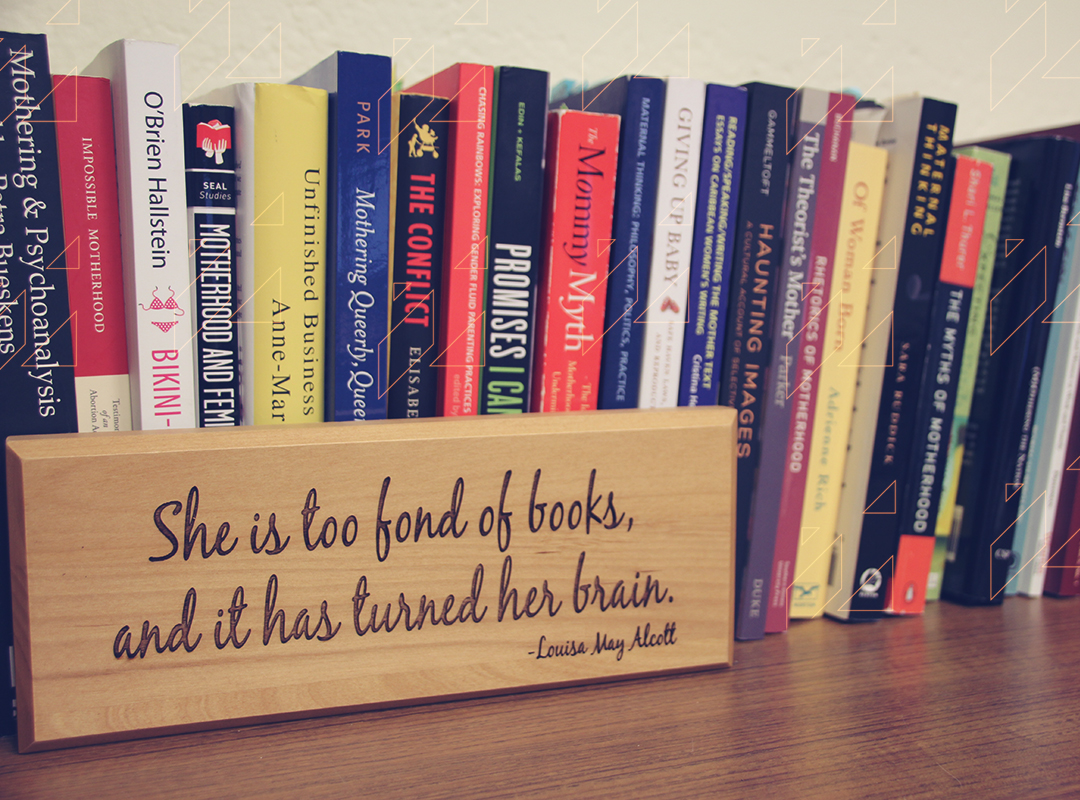
I’m “that” aunt: 99 times out of 100, my gift to you is going to be a book… or two… or three. For the past few years, I’ve watched memes about jólabókaflóð circulate Facebook with curiosity and longing. If you’ve missed this new cultural phenomenon, jólabókaflóð is the Icelandic tradition of giving books (gifts are traditionally exchanged on Christmas Eve) and then spending the late hours of the evening reading. Who wouldn’t want to live where the arrival of the Bokatidindi (a catalogue of every new book published that year in Iceland) kicks off the holiday season and your holiday is considered a bust if you aren’t gifted at least one book? I’m also thinking through possibilities of adapting Guinevere de la Mare’s gift-giving creation, which she calls “one part Jolabokaflod, one part Blind Date with a Book.”
For me, a perfect day can be found in the joy of a fleece blanket, a mug of tea, snowflakes drifting down, cracking open a good book that nearly transports me to another world...
Living in Virginia, I can now anticipate having the occasional snow days in a way I never could when I lived in Indiana. In South Bend, we powered through near daily snowfalls with midwestern toughness. We had plows and stockpiles of salt; why would we close? I’d lived there for years before I ever got a snow day (which is not to say I’d lived there for years before I experienced snow!). In fact, that didn’t happen until the mayor declared a state of emergency just so the university would close to facilitate clearing the roads safely... The problem with no snow days was first, obviously the safety factor – I shudder to remember sliding down an icy Edison Road one pre-dawn December Friday to give my final exam – but also, crucially, the loss of a potential contemplative moment. Hygge, another Scandinavian attitude that has been appropriated as a trend, has been described as “comfort [that] exists only in the complete absence of stress and nuisance and feeds off feelings of happiness and relaxation”.
For those of us in the northern hemisphere, dark and cold mark each of our todays a little more forcefully than our yesterdays, both making a hygge-inspired retreat more attractive and more challenging.
That very cold and darkness, though, prompt the natural world to hibernate, an impulse echoed by some religious traditions. While our capitalistic culture encourages frenzy and consumption (all the time, but even more so in December), the spirit of hibernation invites inward reflection and rest. Where the end of the year can bring unrest and uncertainty that marks us, it also offers us permission to “go into this season intentionally, like the animals do, knowing that the darkness and silence can actually be my cue to be still, to wait, to conserve energy, feel whatever I feel”. For those of us looking to open ourselves to winter’s quiet, a well-chosen book can light that path.
And it’s that time of year when “best books” lists proliferate. I've curated some savvy lists for you at the end of this post. But I didn’t want to miss out on the fun of compiling my own picks. So it’s with the comfort of hygge, the spirit of holiday shopping, and the anticipation of some snow days that I offer the following recommendations.
I love historical fiction for the ways that it offers glimpses into bygone lives. I love needlepoint for how it enables me to create art out of a blank canvas and skeins of thread. So I knew I needed to read Tracy Chevalier’s newest novel, A Single Thread, when I saw reviews of it popping up in my needlepoint FB groups. How do you make a life for yourself in a world that has been broken open and reassembled in ways you cannot begin to recognize? Violet Speedwell finds an answer for herself when she joins her village’s society of broderers.
There are a few moments at the beginning of Veronica Henry’s How to find Love in a Bookshop that might make you fear it will be a mis-mash of Notting Hill and You've Got Mail... but it's nothing like them in the end. Sure, the bookstore is there, the deep goofy bonds of longtime friends who will do anything for you ties together plotlines, but there's so much more than both films combined. I don’t often read a book in a single sitting anymore – but I spent the day before Thanksgiving in Emilia’s world, leaving only to bake pies in my own, and just a little sad to reach the last page.
In Gingerbread by Helen Oyeyemi, Perdita learned to make magical gingerbread from her mother Harriet when they still lived in Druhástrana, a country that may or may not exist. This lyrical novel offers a powerful mediation on the meaning of home and the impact of migration on familial bonds.
Rey Terciero and Bre Indigo give us a warm, gorgeous (meant both literally and figuratively) retelling of Little Women in Meg, Jo, Beth, and Amy: A Graphic Novel. Little Women is one of my treasured top-5 novels, so I approached this version cautiously. Transposed to present-day New York City, Meg, Jo, Beth, and Amy gives us a blended, biracial March family. For both me and my daughter (who very loudly loved this!), the updates work well to introduce a new generation of readers to Alcott’s beloved characters. We highly recommend you check it out before going to see Greta Gerwig’s film. If Mr. March’s shadowy presence has always intrigued you, I urge you to check out March, by Geraldine Brooks, in which she explores his Civil War experiences.
Virginia Wrathmell, The Orphan of Salt Winds, has always known that she would die one New Year’s Eve. Elizabeth Brooks intertwines past and present in alternating chapters to slowly bring readers to understand why Virginia must die that night in this haunting coming of age narrative. Last month, I was in San Francisco for a conference and alumni visits, and I discovered this novel in City Lights Bookstore. Reading it as the fog rolled in each evening only added to the atmosphere it weaves.
Sujata Massey takes us back to 1920s India in The Widows of Malabar Hill. Her protagonist, Perveen Mistry, is Bombay’s first female lawyer. Perveen is meant to be executing the will of one of her law firm’s clients when she discovers that it disinherits his three widows who live in purdah, in favor of a suspicious charity. Her investigation into the circumstances of their signing of this will turns deadly in this first volume of a new mystery series.
The Cold Way Home by Julia Keller is the 8th novel in her mystery series, set in Ackers Gap, WV. The protagonist of the series, Bell Elkins, escapes the tiny Appalachian town for college, but comes back after law school to serve as the prosecuting attorney. The entire series offers an unflinching look at the impact of opioids and economic troubles on the region – but also celebrates the resilience and humanity of its characters.
The Last List of Miss Judith Kratt by Andrea Bobotis, with its fascinatingly repelling echoes of Faulkner’s “A Rose for Emily,” gently nudges its readers to question what we memorialize and why. In the “Conversation with the Author” at the back of the book, Bobotis notes that “For Southerners, our willingness to engage with the fraught history of objects in our region—for example, the problem of Confederate monuments—is critical,” and as Judith makes her last list, readers vicariously experience the accounting of impact that accompanies her assessment of value.
Harriet writes the advice column for her college newspaper in Katie Heaney’s Dear Emma. The book most obviously focuses on her experience of being ghosted by her boyfriend of a few weeks (should “boyfriend” be in quotes? Harriet’s not sure what their status is…), but I found its exploration of her friendships even more compelling.
Last summer, Morgan Jerkins pulled me right into her world, sketched out in the essays that make up This Will be my Undoing: Living at the Intersection of Black, Female, and Feminist in (White) America. Her powerful witness to the impact of her race and gender on her growing-up experiences in South Jersey and her university years at Princeton convinced me that she was the exact perfect speaker for the Women’s Center’s Public Talk for the MLK Community Celebration. I’m so looking forward to hearing her in January!
And next up on my reading list?
There There by Tommy Orange follows a large cast of Native Americans who live in the Oakland, California, area as they come together at a community pow wow.
Laura Cumming explores her mother's brief disappearance as a child, uncovering a web of secrets surrounding this experience in the process, in Five Days Gone: The Mystery of My Mother’s Disappearance as a Child.
Akin by Emma Donoghue pairs Noah Selvaggio, a retired chemistry professor and childless widower, and his great-nephew Michael, an 11-year-old he’s never met but nevertheless agrees to take in temporarily after Michael’s grandmother (and guardian) dies.
And everything on Nancy Pearl’s list…
Happy reading!
A few of the best best-of lists:
- Books for the holidays: To give, and to get you through from our friends at the Festival of the Book
- Two 10-Best lists from Slate's book critic and books editor
- The best children’s books and best books from the Washington Post
- And a love letter to books from Rachel Brozenske at Allison Partners

